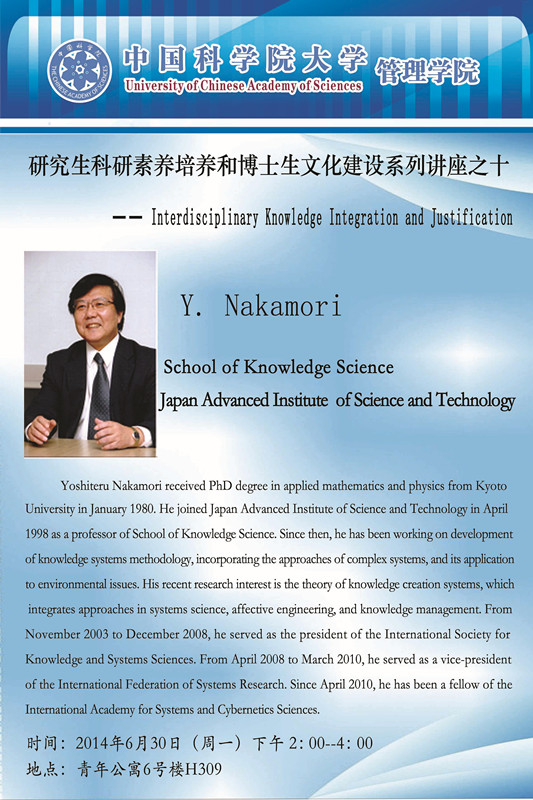Interdisciplinary Knowledge Integration and Justification
青年公寓6号楼H309
- 讲座题目:Interdisciplinary Knowledge Integration and Justification
- 讲座嘉宾:Dr. Y. Nakamori,School of Knowledge Science,Japan Advanced Institute of Science and Technology
- 讲座时间:2014年6月30日(周一)下午:2:00-4:00
- 讲座地点:青年公寓6号楼H309
- 讲座内容:
We understand that mathematical systems approaches are not sufficient to provide effective answers to contemporary complex problems. Therefore, we established an International Society for Knowledge and Systems Sciences in the year of 2000, in which we have been discussing new systems approaches that incorporate methods of knowledge management. From this background, a theory of knowledge construction systems was born. It is a systems approach to synthesize a variety of knowledge and justify or verify new knowledge.
The theory consists of three parts in relation to each other: a knowledge construction model; analysis of actors’ abilities against social structures; knowledge justification principles. This theory deals with different types of knowledge integration: specialized integration; interdisciplinary integration; intercultural integration. In this presentation, after presenting the theory, examples of interdisciplinary and intercultural knowledge integration will be introduced in detail: a sales management system of perishable goods; a regional health management system of mild diabetes. Finally, possible future studies will be discussed.
- 嘉宾简介:
Yoshiteru Nakamori received PhD degree in applied mathematics and physics from Kyoto University in January 1980. He joined Japan Advanced Institute of Science and Technology in April 1998 as a professor of School of Knowledge Science. Since then, he has been working on development of knowledge systems methodology, incorporating the approaches of complex systems, and its application to environmental issues. His recent research interest is the theory of knowledge creation systems, which integrates approaches in systems science, affective engineering, and knowledge management. From November 2003 to December 2008, he served as the president of the International Society for Knowledge and Systems Sciences. From April 2008 to March 2010, he served as a vice-president of the International Federation of Systems Research. Since April 2010, he has been a fellow of the International Academy for Systems and Cybernetics Sciences.
